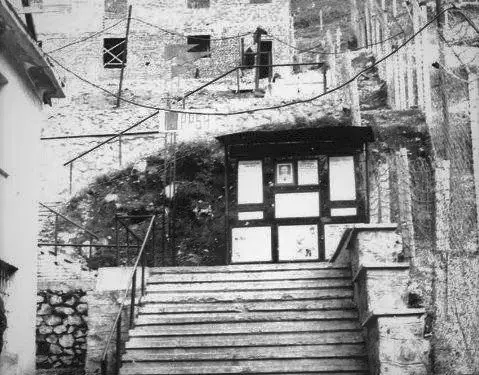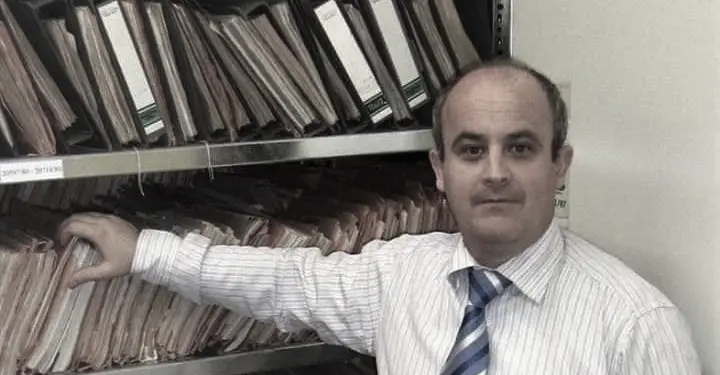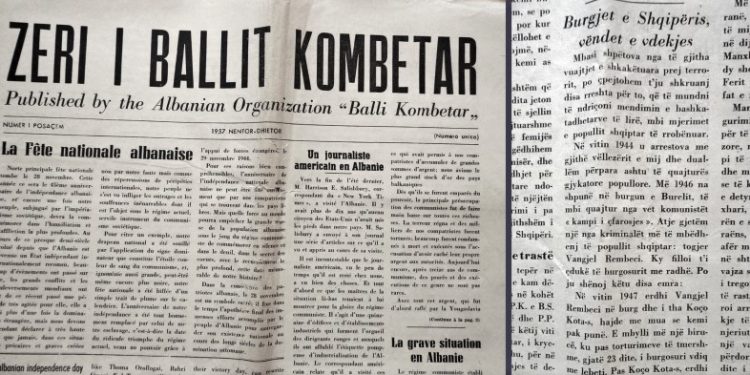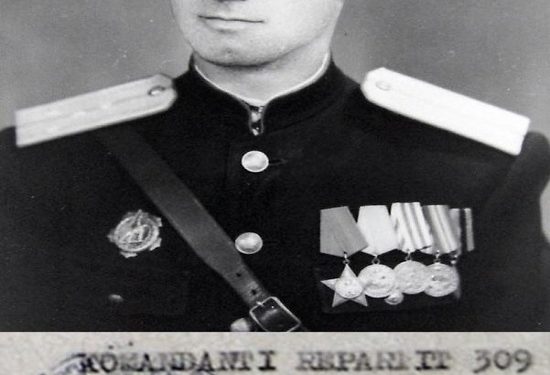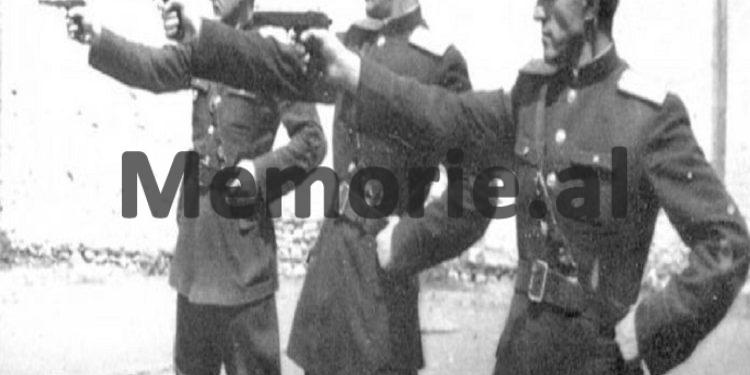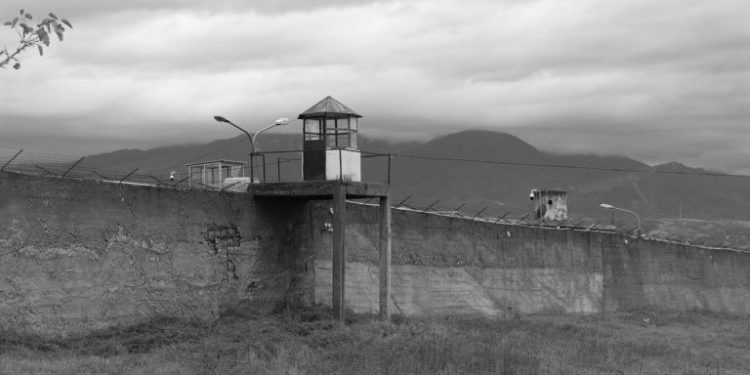By Kastriot Dervishi
Rare confession: “In the prison of Burrel, the commander Vangjel Rrêmbeci, drowned in torture Koço Kota, Atif Golje, Qemal Vrioni, Mihal Bellkemeni, etc., while the most brutal policemen were: Asllan Panariti from Këlcyra, Qirko Mariani from Fieri, Fahri Dragozhdi from Pogradeci, Birçe Kamberi and Naun Tiko from Vlora, etc.
Memorie.al / The newspaper “Zëri i Ballit Kombëtar”, from the period November-December 1957, which was published in the West by the leaders of the Albanian anti-communist diaspora who escaped from Albania after 1944 when the communists came to power led by Enver Hoxha, publishes among others, also a writing of a fugitive, named Ismail Çeprati, a former political prisoner, escaped from Albania in 1957, who was in the Llavrios Camp in Greece, waiting to receive the status of a political asylum seeker , to different countries of the West. The newspaper in question ordered that: “Albanians who fled Albania in time, tempted by communist propaganda (which the newspaper calls “communist gibberish”), would do well to read this article, in order to understand the situation in Albania.” In this article, the former commander of some of the prisons of communist Albania, Lieutenant Vangjel Rrêmbeci, is mentioned, as well as some of the prisoners he drowned in torture while he was the commander of Burrel Prison. Similarly, in the said article of the newspaper “Zëri i Ballit Kombëtar”, which we are also publishing with the relevant facsimile, the fugitive Ismail Çeprati, in addition to some of the executioner policemen who drowned some prisoners under torture, mentions with names and surnames senior leaders of the Security, perverted people, who abused imprisoned girls and women, or from “reactionary and enemies of the people” families, as the communist regime in power labeled them. For more, we know the letter of the former fugitive Ismail Çeprati, published in “Zëri i Balit Kombëtar”, in the period November-December, 1957.
The story of Ismail Çeprat, from the Llavrio camp in Greece
After I escaped from all the suffering caused by terror, I hasten to write you a few lines about them, so that you can enlighten the opinion of free compatriots on the miseries of the captive Albanian people.
In 1944, I was arrested with all my brothers and we appeared before the so-called “people’s court”. In 1946, we were imprisoned in Burrel prison, nicknamed by the communists as “Prison of Death”.
There we found one of the biggest criminals of the Albanian people, Lieutenant Vangjel Rrêmbec. He began to eliminate the prisoners one after the other. I am marking some names for you:
– In 1947, Vangjel Rrêmbeci came to prison and told Koço Kotta to come with him because he had little work. He locked him in a dungeon where, after 23 days of terrible torture, the prisoner died of starvation.
– After Koço Kota, it was Qemal Vrioni’s turn. This one also disappeared in the dungeons after a few days.
-After this second one was over, Mihal Bellkamenji was called by lieutenant Vangjelit, who after a few days had the same fate as the first ones.
– How did Mihali die, called Atif Goljen.
To write about all the names of the martyrs who ended up in the hands of lieutenant Vangjeli in the dungeon, it would take volumes. After some time, the tactic was changed, as they had started, with long tortures, the extermination could not be done quickly.
In order to achieve the goal of disappearing the prisoners in masse, and not one by one, they cut our bread and did not even allow the children to bring us food. But even if they let them free, they had nothing to bring us.
In 1948, mass deaths began in Burrel prison, from starvation and torture. At least one or two people a day died. The wood waved without rain. At that time, the prison had three regimes headed by three policemen: Asllan Panariti from Këlcyra, Qirko Mariana from Fieri and Fahri Dragozhdi, from Pogradeci.
From these criminals, one worse than the other, the prisoners removed the olive black. These often gave contrary orders and when they got angry with each other, they took out their anger on the deserted prisoners, causing them unspeakable torment and torture. This is how Hamdi Gosa and Rasim Bozhigradi died, and many others.
Another way of torture and extermination in Burrell prison was when one of the prisoners fell ill. They ended this with a fat one in the dungeon. The latter was closed with the condemned to eat his food.
When Sefedin Dine was sick, I heard Vangjeli himself, when he said to Birçe Kamberi: “You really hate this”. He answered: “This one is gone, but bring another.” They kept a dead man in the dungeon for three days, in order to eat his food.
The communists were not satisfied when they oppressed us men in Burrel, they brought there our sisters, women and girls like Musine Kokalari, Erifili Bezhani, and many others. Even for these they had ways of torturing them.
A part continues to be held in Burrel today. On 11.2.1952, I was brought to Tirana, where I found my other prison mates. They made me aware of the inhumane deeds of Manjhar Shima from Delvina and his two friends, one named Ferit Ukati, who had been heads of the regions of Tirana.
Manjhar Shima, as a Security lieutenant with unlimited powers, to satisfy his animal desires, in the evening went to the house of a ballista in a “Jeep” and took a girl telling her to look for Security.
The forced girl went with him. But Manjhari, instead of taking her to the Security office, took her out of Tirana, where he kept her until one hour in the morning and took her back to her house. The next day, the girl went to Mehmet Shehu and told him the incident.
Mehmeti, in this case, remained close and ordered the arrest and death sentence of the culprit. However, the man who had touched the honor of an Albanian girl was spared his life and not long after, his sentence was also forgiven. Today he is in the ministry in a much higher position than what he had before.
The same is the case with Ferit and his friends, when in May 1951, they were sentenced to death for very serious immorality, but in February 1952, they were released by a special decision.
On June 20, 1952, I was sent to Vlora with 25 other friends, as a mason. Even today I possess this mastery that I forced myself to learn.
In Vlora, we worked for 20 months without fail. We have built a prison there, where all the people of Vlora can be put, big and small, but it is still not full. In this building, I have built with my own hands 18 dungeons, which are tombs for the living.
They have a door and a very small window on the terrace, not for light, but only for a little air, because they also have a cement slab on top. Vlora prison had another executioner, named Lieutenant Naun Tiko. In this prison was a ballistic girl, Raile Luzaj.
This girl is idealistic, courageous, smart, with high morals, equipped with all the qualities that a rare Albanian girl who did honor to the National Front can have. This girl is arrested and tortured in a special way by the criminal lieutenant.
A group of 30 or 35 girls were condemned to work with us, including Raileja. One day I heard Naum when he told a girl named Afet Dervishi, a partisan of 1942 and Bule Ramiz, who was friends with her, to beat Raila, and not to be afraid at all, that nothing could be done.
Afet Dervishi was convicted of theft. Raileja realized this plot herself, but I told her. After a few days, the lonely Raila was severely beaten by her former partisan friends pushed by the lieutenant. The beating was not enough, but the lieutenant locked Railen in the dungeon, kept him without bread and water for 4 days.
As we finished the building of the terrible prison in Vlora, they pierced us again in Tirana, on 7.1.1954. In that spring, a group of prisoners, unable to endure the torture, opened the prison to escape.
Unfortunately, they were caught and referred to the court. Isuf Velçani, Zyhdi Mancaku and two others were sentenced to death again and shot.
Others were sentenced to life imprisonment. The tragedy in Albania’s prisons continues. On September 21, 1954, I was released from prison and interned in Lushnje. On July 7, 1957, I left my homeland and came here. Memorie.al
November 1957 Ismail Çeprati
Camp Lavrion Greece




